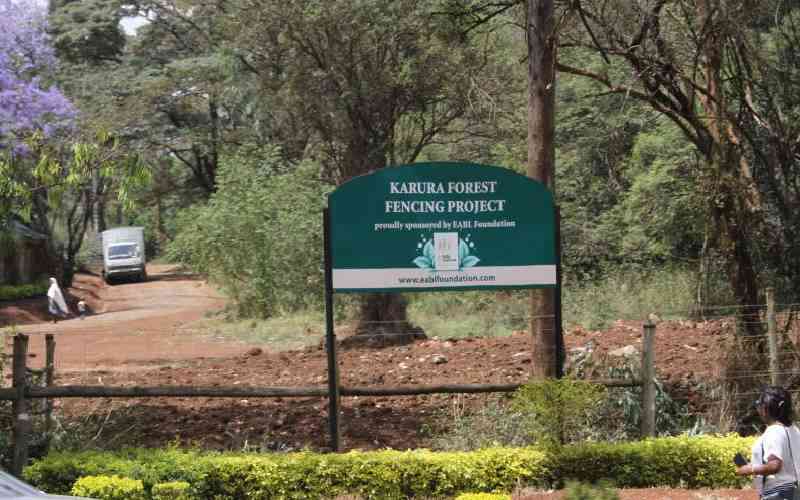
A fresh battle is looming over control of Karura Forest in Nairobi.
Meanwhile, park entry fees paid via the eCitizen platform have nearly doubled—rising from Sh100 to Sh174 per adult, and from Sh50 to Sh116 per child.
This includes entrance fees, eCitizen charges and Value Added Tax (VAT). Initially, entrance was VAT exempt.
Friends of Karura Forest (FKF) have accused the government of unilaterally taking over the forest’s operations. The group says the move violates the spirit of partnership with the Kenya Forest Service (KFS).
“This decision disregards the Karura Forest Management Plan (2021–2041), a legally binding 20-year agreement that mandates joint management between KFS and FKF,” said Prof Njuguna Njoroge, a board member.
The standoff stems from a letter dated August 28, 2025, in which Chief Conservator of Forests, Alex Lemarkoko, formally directed that all payments at the Karura Forest Reserve be made exclusively through the eCitizen platform.
- Kenya secures historic win to host global forestry congress
- Government banks on new strategy to increase tree cover
- How Kaptagat's green model has revived forests, boosted incomes
- Sh34m windfall: Kwale community tastes 'sweet' carbon credits money
Keep Reading
“Effective immediately, all gate fees and other charges levied within the Karura Forest Reserve will be processed exclusively through the eCitizen digital payment platform,” Lemarkoko wrote.
But FKF insisted that the decision goes beyond the mode of payment, claiming it amounts to a takeover of the forest’s day-to-day management that undermines years of community-led stewardship.
“For 15 years, the Friends of Karura have worked hand in hand with the KFS under the Participatory Forest Management Plan to transform Karura from a den of crime into a globally acclaimed urban forest. This sudden move by the government to seize direct control without consultation disregards the contribution of the community and jeopardises the progress achieved,” said Njoroge.
FKF has now called on the government to immediately reverse the decision to end the joint management arrangement, warning that lack of clarity on financing threatens the forest’s survival.
“The lack of transparency around the KFS takeover of the fee collection on Saturday has left FKF without any guarantee of the availability of funds necessary to ensure the continued successful operation of Karura Forest,” the group noted in a statement.
FKF also accused KFS of misrepresenting the terms of their 20-year joint management agreement.
“KFS incorrectly alleged in a press release that the new eCitizen payment system will not affect the institutional arrangements between themselves and the Friends of Karura Forest.
This completely misrepresents the 20-year KFS/FKF Joint Management Agreement which specifies the joint obligations of the parties,” the statement read in part.
According to FKF, the agreement clearly stipulates that all revenues collected from Karura entrance gates, events, and other activities must be deposited into an account jointly managed by both parties, with the funds earmarked for paying staff salaries, maintaining infrastructure, and implementing the forest management plan.
“In line with this agreement, FKF have overseen and managed all contracts related to operations, salaries for staff, security, infrastructure and forest regeneration within Karura and remain financially liable for all these contracts. However, the abrupt transition to the eCitizen revenue collection means FKF has lost all access to the funds it has used to manage the forest,” the group said.
The group noted that managing Karura Forest costs between Sh10–12 million monthly, yet there are no assurances of funds to sustain the work.
 The Standard Group Plc is a multi-media organization with investments in media
platforms spanning newspaper print
operations, television, radio broadcasting, digital and online services. The
Standard Group is recognized as a
leading multi-media house in Kenya with a key influence in matters of national
and international interest.
The Standard Group Plc is a multi-media organization with investments in media
platforms spanning newspaper print
operations, television, radio broadcasting, digital and online services. The
Standard Group is recognized as a
leading multi-media house in Kenya with a key influence in matters of national
and international interest.











